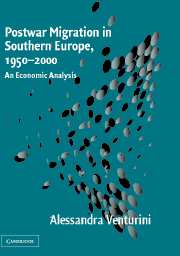Book contents
- Frontmatter
- Contents
- List of Figures and Tables
- Acknowledgments
- Introduction
- 1 The Evolution of Migration in Southern European Countries
- 2 The Choice to Migrate
- 3 The Effects of Immigration on the Receiving Country
- 4 The Effects of Emigration on the Country of Origin
- 5 The Effectiveness of Migration Policies
- References
- Index
4 - The Effects of Emigration on the Country of Origin
Published online by Cambridge University Press: 25 June 2009
- Frontmatter
- Contents
- List of Figures and Tables
- Acknowledgments
- Introduction
- 1 The Evolution of Migration in Southern European Countries
- 2 The Choice to Migrate
- 3 The Effects of Immigration on the Receiving Country
- 4 The Effects of Emigration on the Country of Origin
- 5 The Effectiveness of Migration Policies
- References
- Index
Summary
This chapter examines how migration affects the departure country. We have adopted a domestic view, which considers only those people who remain in the country of departure. In contrast, a national approach would also include the specific benefits that an emigrant gains by going abroad. This latter definition, especially if long-term migration is being considered, is not wholly appropriate for measuring the effect of migration in the departure country, and therefore only those variables that relate to the departure country have been considered.
Researchers have tried to measure the effect of migration on economic growth in the departure country, bearing in mind that a decrease in population should produce an increase in per-capita income, whereas the loss of human capital through emigration could, instead, decrease the rate of income growth. However, these effects are accompanied by a flow of remittances, which should favor economic growth. This is because such payments help to reduce financial constraints on productive activities and encourage household consumption. In the longer term, migration of the most educated could foster investment in education by those who remain. This could stimulate economic growth, and some workers, having increased their human capital abroad, could be persuaded to return, something that should also favor economic growth.
Attempts to construct an overall balance sheet of the consequences of migration have often been hampered by the lack of information.
- Type
- Chapter
- Information
- Postwar Migration in Southern Europe, 1950–2000An Economic Analysis, pp. 168 - 203Publisher: Cambridge University PressPrint publication year: 2004



